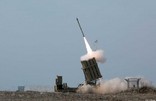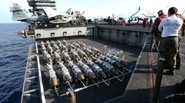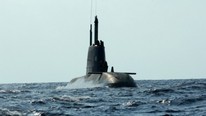13 dec 2014

United States Congress will vote, in the next few days, on a resolution to raise its financial contribution to the Israeli Iron Dome system to 1.2 billion dollars.
Congressional negotiators agreed on a resolution to spend 1.1 trillion dollars, including 351 million dollars to finance the Iron Dome in 2015, according to the PNN.
The financial project reportedly covers a sum total of 619.8 million dollars for the Israeli arms program, including an extra 172 million dollars for missile defense systems.
However, the resolution holds back 175 million dollars of the total sum until the Israelis provide more documents, to the Pentagon and Congress, in regard to the program and behind-schedule plans to build part of the system in the United States.
Congress' condition is to involve US companies in manufacturing parts of the Iron Dome in collaboration with Israel's "Rafael" company for arms development.
PNN further reports that "Raytheon", a major American defense contractor and the world's largest producer of guided missiles, won an Israeli contract last September to supply $149.3 million in Tamir missiles, the projectiles used in Israel's Iron Dome defense system.
Congressional negotiators agreed on a resolution to spend 1.1 trillion dollars, including 351 million dollars to finance the Iron Dome in 2015, according to the PNN.
The financial project reportedly covers a sum total of 619.8 million dollars for the Israeli arms program, including an extra 172 million dollars for missile defense systems.
However, the resolution holds back 175 million dollars of the total sum until the Israelis provide more documents, to the Pentagon and Congress, in regard to the program and behind-schedule plans to build part of the system in the United States.
Congress' condition is to involve US companies in manufacturing parts of the Iron Dome in collaboration with Israel's "Rafael" company for arms development.
PNN further reports that "Raytheon", a major American defense contractor and the world's largest producer of guided missiles, won an Israeli contract last September to supply $149.3 million in Tamir missiles, the projectiles used in Israel's Iron Dome defense system.
4 dec 2014

The Brazilian state of Rio Grande do Sul has revoked a major collaboration deal with the Israeli military company Elbit Systems in the wake of protests over the firm’s role in serious violations in the occupied Palestinian territories.
Brazilian social movements and trade unions as well as Palestinian groups in the country had called on the Brazilian authorities to cancel the deal over Elbit’s role in the construction of Israel’s illegal apartheid wall in the occupied West Bank and Jerusalem and its cooperation with the Israeli army, especially during the last war on the Gaza Strip.
"Our government has always given centrality to the promotion of peace and human rights and considers the demands of the social movements an important voice that needs to be heard. Today’s announcement is a logical consequence of this," Tarson Nunez, coordinator of the international relations department of the Rio Grande do Sul government, stated.
Rio Grande do Sul governor Tarso Genro had signed in April 2013 a research cooperation deal making Elbit the first Israeli military company to lead Brazilian military projects.
According to this deal, Elbit was also to be provided access to public funding and technologies produced by four Brazilian universities.
In a press release, Genro declared the memorandum of understanding with the Israeli company to be void.
Major BDS Win: Elbit Loses Brazil Deal
The Brazilian state of Rio Grande do Sul has cancelled a major collaboration deal with Israeli military company Elbit Systems in the wake of protests over the firm’s role in oppression of Palestinians.
Brazilian social movements and trade unions and Palestinian groups had called on authorities to cancel the deal over Elbit’s role in the construction of Israel’s illegal apartheid Wall in the occupied West Bank and its close relationship with the Israeli military.
Tarson Nuñéz, the coordinator of the international relations department of the Rio Grande do Sul government described his government’s decision by saying:
“Our government has always given centrality to the promotion of peace and human rights and considers the demands of the social movements and important voice that needs to be heard. Today’s announcement is a logical consequence of this.”
Drones supplied by Elbit Systems were tested during Israel’s recent attack on Gaza that killed more than 2,100 Palestinians, and Elbit’s share price has risen since the massacre as investors anticipated a rise in orders of technology that was used for the first time during the attacks.
Rio Grande do Sul governor Tarso Genro had signed a research cooperation deal making Elbit the first Israeli military companyto lead Brazilian military projects in April 2013. Elbit was to be provided access to public funding and technologies produced by four local universities. Ongoing protests and lack of federal support had weakened the project. In his open letter, Genro declared the memorandum of understanding to be “void of meaning”.
A $17m plan to build a military satellite is among the projects cancelled by Tuesday’s announcement
Brazilian social movements and trade unions as well as Palestinian groups in the country had called on the Brazilian authorities to cancel the deal over Elbit’s role in the construction of Israel’s illegal apartheid wall in the occupied West Bank and Jerusalem and its cooperation with the Israeli army, especially during the last war on the Gaza Strip.
"Our government has always given centrality to the promotion of peace and human rights and considers the demands of the social movements an important voice that needs to be heard. Today’s announcement is a logical consequence of this," Tarson Nunez, coordinator of the international relations department of the Rio Grande do Sul government, stated.
Rio Grande do Sul governor Tarso Genro had signed in April 2013 a research cooperation deal making Elbit the first Israeli military company to lead Brazilian military projects.
According to this deal, Elbit was also to be provided access to public funding and technologies produced by four Brazilian universities.
In a press release, Genro declared the memorandum of understanding with the Israeli company to be void.
Major BDS Win: Elbit Loses Brazil Deal
The Brazilian state of Rio Grande do Sul has cancelled a major collaboration deal with Israeli military company Elbit Systems in the wake of protests over the firm’s role in oppression of Palestinians.
Brazilian social movements and trade unions and Palestinian groups had called on authorities to cancel the deal over Elbit’s role in the construction of Israel’s illegal apartheid Wall in the occupied West Bank and its close relationship with the Israeli military.
Tarson Nuñéz, the coordinator of the international relations department of the Rio Grande do Sul government described his government’s decision by saying:
“Our government has always given centrality to the promotion of peace and human rights and considers the demands of the social movements and important voice that needs to be heard. Today’s announcement is a logical consequence of this.”
Drones supplied by Elbit Systems were tested during Israel’s recent attack on Gaza that killed more than 2,100 Palestinians, and Elbit’s share price has risen since the massacre as investors anticipated a rise in orders of technology that was used for the first time during the attacks.
Rio Grande do Sul governor Tarso Genro had signed a research cooperation deal making Elbit the first Israeli military companyto lead Brazilian military projects in April 2013. Elbit was to be provided access to public funding and technologies produced by four local universities. Ongoing protests and lack of federal support had weakened the project. In his open letter, Genro declared the memorandum of understanding to be “void of meaning”.
A $17m plan to build a military satellite is among the projects cancelled by Tuesday’s announcement
28 nov 2014

The United States Department of Defense has announced that it will supply the Israeli air force with 3,000 smart bombs (precision-guided munitions designed to achieve greater accuracy).
The funding for the sale will come from US military aid to Israel, and will be paid until the end of November, 2016. The United States provides Israel with some $8.5 million in military aid each day, while it gives Palestinians $0.
See: U.S. Military Aid and the Israel/Palestine Conflict, at If Americans Knew, for details.
Palestine has no official armed wing outside of PA security coordination with Israel, with any militarized response to aggression from occupation forces left in the hands of ill-equipped political brigades and other homegrown resistance groups. The infamous rockets reported to be fired from Gaza are, by default, little more than hollow tubes stuffed with dynamite and typically fall into unpopulated areas of the Negev Desert.
Al Ray reports that, according to media sources, the cost of the recent deal is estimated at $82 million, through which the Israeli air force will receive three thousand G-DAM model bombs.
Israel drew heavy criticism after a one-ton smart bomb meant for a senior Palestinian militant also killed 15 civilians in an attack in the Gaza Strip in July of 2002.
These bombs can hit its targets precisely, by routers. Israel used these bombs on a large scale against several targets in the last Israeli aggression against the Gaza Strip. However, the majority of over 2,000 "casualties" reported from Gaza, this past summer, were civilian in nature.
Israeli military officials would not say whether the bombs might be intended for use against Iran, but ruled out the possibility that they could be used against Palestinian targets.
The funding for the sale will come from US military aid to Israel, and will be paid until the end of November, 2016. The United States provides Israel with some $8.5 million in military aid each day, while it gives Palestinians $0.
See: U.S. Military Aid and the Israel/Palestine Conflict, at If Americans Knew, for details.
Palestine has no official armed wing outside of PA security coordination with Israel, with any militarized response to aggression from occupation forces left in the hands of ill-equipped political brigades and other homegrown resistance groups. The infamous rockets reported to be fired from Gaza are, by default, little more than hollow tubes stuffed with dynamite and typically fall into unpopulated areas of the Negev Desert.
Al Ray reports that, according to media sources, the cost of the recent deal is estimated at $82 million, through which the Israeli air force will receive three thousand G-DAM model bombs.
Israel drew heavy criticism after a one-ton smart bomb meant for a senior Palestinian militant also killed 15 civilians in an attack in the Gaza Strip in July of 2002.
These bombs can hit its targets precisely, by routers. Israel used these bombs on a large scale against several targets in the last Israeli aggression against the Gaza Strip. However, the majority of over 2,000 "casualties" reported from Gaza, this past summer, were civilian in nature.
Israeli military officials would not say whether the bombs might be intended for use against Iran, but ruled out the possibility that they could be used against Palestinian targets.
26 nov 2014

The British government stated, on Monday, that it will review arms export licenses to Israel, to ensure that the use of such weapons does not contravene international law.
Britain reviewed, in August, all arms export licenses to Israel after the recent military assault on Gaza, announcing that it will halt 12 arms export licenses to Israel if military operations in Gaza are resumed.
According to Al Ray, the new reviews come following recent reports of a Palestinian killed by Israeli soldiers, near the border fence, in the Gaza Strip.
A spokesperson for Britain claimed that the August reviews reflect that most licensed exports to Israel do not includes materials used in the Gaza assault.
Furthermore, in July, a British parliamentary committee issued a report stating that the outstanding contracts approved by the government include export of dual-use or military goods to Israel. It estimated the cost of these goods up to 7.8 billion pounds (US $ 12.3 billion), and includes contracts to provide body armor components, unmanned aircraft and missile parts to Israel.
A group called "Campaign against the Arms Trade" recently published an analysis which shows that Britain had approved military licenses to Israel worth 7 million pounds, just six months prior to the war on Gaza.
The government says that it does not cast doubt on the figure.
Britain reviewed, in August, all arms export licenses to Israel after the recent military assault on Gaza, announcing that it will halt 12 arms export licenses to Israel if military operations in Gaza are resumed.
According to Al Ray, the new reviews come following recent reports of a Palestinian killed by Israeli soldiers, near the border fence, in the Gaza Strip.
A spokesperson for Britain claimed that the August reviews reflect that most licensed exports to Israel do not includes materials used in the Gaza assault.
Furthermore, in July, a British parliamentary committee issued a report stating that the outstanding contracts approved by the government include export of dual-use or military goods to Israel. It estimated the cost of these goods up to 7.8 billion pounds (US $ 12.3 billion), and includes contracts to provide body armor components, unmanned aircraft and missile parts to Israel.
A group called "Campaign against the Arms Trade" recently published an analysis which shows that Britain had approved military licenses to Israel worth 7 million pounds, just six months prior to the war on Gaza.
The government says that it does not cast doubt on the figure.
3 sept 2014

Israel will add a fourth advanced Dolphin-Class submarine to its naval fleet within the next few days, the commander of the Israel Navy said Tuesday.
“At this very moment, after leaving Germany, the INS Tanin, the Navy and the State of Israel’s fourth submarine, is making its way to Israel,” Vice Admiral Ram Rothberg said at a ceremony for graduates of a naval course. “It can dive deeper, go farther for a longer time and can operate at a level we have not seen until today.”
The impending arrival of the INS Tanin will bolster a submarine fleet has seen dramatic increases in the number and duration of its operational at-sea deployments over the past several years.
According to a senior Israel Navy officer, 58 percent of the submarine flotilla’s time at sea in 2013 was spent in operational deployments, the other 42% having been devoted to training. That marks a dramatic increase from the three previous years, when submarines spent just 36% of their time at sea in operational deployments.
The submarines also conducted 54 special operations in 2013, a similarly sharp increase from previous years. The operations included deployments to the Lebanese coast and unspecified deployments lasting several weeks that took the submarines thousands of kilometers from Israel.
Israel is also scheduled to receive a fifth Dolphin-Class submarine from Germany, the INS Rahav, later in 2014.
The new submarines have engines that don’t require surfacing to acquire new air supplies, effectively expanding Israel’s naval (and, reportedly, nuclear) reach and allowing for more distant and long-lasting operations.
In 2012, the German weekly Der Spiegel reported that Israel’s submarine fleet has nuclear capabilities and that Berlin is aware of this but has opted to publicly remain mum about it in order to avoid having to defend the deals.
The submarines, according to Der Spiegel, are equipped with Israeli-designed Popeye missiles, which can carry a warhead of up to 200 kilograms. The nuclear warheads are produced at Israel’s Dimona nuclear reactor, the report said.
Israel maintains a policy of nuclear ambiguity, neither confirming nor denying that it is in possession of nuclear weapons.
“At this very moment, after leaving Germany, the INS Tanin, the Navy and the State of Israel’s fourth submarine, is making its way to Israel,” Vice Admiral Ram Rothberg said at a ceremony for graduates of a naval course. “It can dive deeper, go farther for a longer time and can operate at a level we have not seen until today.”
The impending arrival of the INS Tanin will bolster a submarine fleet has seen dramatic increases in the number and duration of its operational at-sea deployments over the past several years.
According to a senior Israel Navy officer, 58 percent of the submarine flotilla’s time at sea in 2013 was spent in operational deployments, the other 42% having been devoted to training. That marks a dramatic increase from the three previous years, when submarines spent just 36% of their time at sea in operational deployments.
The submarines also conducted 54 special operations in 2013, a similarly sharp increase from previous years. The operations included deployments to the Lebanese coast and unspecified deployments lasting several weeks that took the submarines thousands of kilometers from Israel.
Israel is also scheduled to receive a fifth Dolphin-Class submarine from Germany, the INS Rahav, later in 2014.
The new submarines have engines that don’t require surfacing to acquire new air supplies, effectively expanding Israel’s naval (and, reportedly, nuclear) reach and allowing for more distant and long-lasting operations.
In 2012, the German weekly Der Spiegel reported that Israel’s submarine fleet has nuclear capabilities and that Berlin is aware of this but has opted to publicly remain mum about it in order to avoid having to defend the deals.
The submarines, according to Der Spiegel, are equipped with Israeli-designed Popeye missiles, which can carry a warhead of up to 200 kilograms. The nuclear warheads are produced at Israel’s Dimona nuclear reactor, the report said.
Israel maintains a policy of nuclear ambiguity, neither confirming nor denying that it is in possession of nuclear weapons.
24 june 2014

Palestinian medical sources have reported that two Palestinians were wounded after a number of settlers chased their car, and threw a gas bomb at it, near the central West Bank city of Ramallah.
Local sources said the attack took place near Deir Bzei’ village, west of Ramallah. The settlers came from a nearby illegal Israeli settlement.
The sources said that a settler’s car chased a Palestinian car on a joint road, used by Israeli settlers, and also leads to a number of Palestinian villages and towns, west of Ramallah, before a settler threw a gas bomb at the car.
Medical sources said the bomb appears to contain ingredients that target the nervous system, causing symptoms similar to paralysis.
Barely able to move and speak, the two wounded Palestinians told Israeli soldiers, at a nearby roadblock, that the settlers have attacked them, and even identified the vehicle, as it was parked nearby the roadblock.
The soldiers did not listen to the complaining Palestinians, and pushed them away after threatening to kidnap them.
On Monday, a number of settlers fired rounds of live ammunition at eight Palestinian workers, near al-Mazra’a al-Gharbiyya village, north of Ramallah, and fled the scene. The Palestinian managed to escape unharmed.
Local sources said the attack took place near Deir Bzei’ village, west of Ramallah. The settlers came from a nearby illegal Israeli settlement.
The sources said that a settler’s car chased a Palestinian car on a joint road, used by Israeli settlers, and also leads to a number of Palestinian villages and towns, west of Ramallah, before a settler threw a gas bomb at the car.
Medical sources said the bomb appears to contain ingredients that target the nervous system, causing symptoms similar to paralysis.
Barely able to move and speak, the two wounded Palestinians told Israeli soldiers, at a nearby roadblock, that the settlers have attacked them, and even identified the vehicle, as it was parked nearby the roadblock.
The soldiers did not listen to the complaining Palestinians, and pushed them away after threatening to kidnap them.
On Monday, a number of settlers fired rounds of live ammunition at eight Palestinian workers, near al-Mazra’a al-Gharbiyya village, north of Ramallah, and fled the scene. The Palestinian managed to escape unharmed.
25 may 2014

The House of Representatives in Washington has demanded that US corporations receive a greater share in the manufacture of Iron Dome as well as Israeli consent to transfer technological information about the system to the US as conditions for expanding the US aid for developing the air defensive systems for the 2015 fiscal year, Hebrew newspaper of Ma’ariv said.
The defense budget appropriations bill for the coming year, which was approved on Thursday by the House of Representatives, expands the aid package for Iron Dome by USD 175 million on top of the USD 176 million that is intended in the Obama administration’s defense budget proposal.
If Israel fulfills the conditions included in the bill, and if the bill is approved by the Senate and is signed by the president, the US will transfer USD 301 million to Iron Dome in 2015. However, the probability that the document, in its current form, will pass this path of obstacles is negligible.
The bill further states that Israel’s other missile programs that are being developed in collaboration with the US, including the Magic Wand system and Arrow missile 3, will receive a total aid package of USD 268.7 million in the 2015 fiscal year. The total aid for the Israeli missile programs amounts to USD 601 million according to the House of Representative’s bill.
The defense budget appropriations bill for the coming year, which was approved on Thursday by the House of Representatives, expands the aid package for Iron Dome by USD 175 million on top of the USD 176 million that is intended in the Obama administration’s defense budget proposal.
If Israel fulfills the conditions included in the bill, and if the bill is approved by the Senate and is signed by the president, the US will transfer USD 301 million to Iron Dome in 2015. However, the probability that the document, in its current form, will pass this path of obstacles is negligible.
The bill further states that Israel’s other missile programs that are being developed in collaboration with the US, including the Magic Wand system and Arrow missile 3, will receive a total aid package of USD 268.7 million in the 2015 fiscal year. The total aid for the Israeli missile programs amounts to USD 601 million according to the House of Representative’s bill.
3 apr 2014

The Palestinian Prisoner Society (PPS) revealed on Thursday that detainee Youssef Abdul Rahim Khatib was subject to drug injection while being arrested by Israeli occupation forces (IOF). An injection was found in the area where Khatib was arrested, his uncle said, adding that the injection caused him “a sudden blackout and breathing difficulty”.
In this regard, PPS executive director Abdullah Zaghari said that the injection will be examined at a specialized laboratory to identify the substance used in the injection. According to Zaghari, the incident represents one of the most serious precedents ever committed by the IOF.
Along the same line, Yousef Khatib, 26, was arrested after IOF soldiers broke into his uncle’s house in Beit Jala and destroyed its properties using sniffer dogs and bombs.
In another development, five Palestinian prisoners continue their hunger strike in Israeli prisons. The detainees said they would continue their strike until their demands were met, Al-Ahrar Center reported.
Fouad Khuffash, the director of Ahrar Center, identified the five hunger strikers namely Aymen Etbish, 32, who has been on hunger strike for 35 days now to protest his administrative detention and 24-year-old Amir Shammas’s hunger strike has by now reached its 83rd day, leading to a deteriorating physical condition. The list also includes Ahmed Al-Khatib, 30, Daoud Hamdane, 33, and Salah Salaht, 37, who have been without food for three consecutive days.
Khuffash further corroborated the existence of several prisoners who are threatening to go on hunger strike and have already refused their meals because of the frequent violations against them in Israeli prisons.
Prisoner Club reveals injection of prisoner when arrested
The Palestinian Prisoner Club Society(PCS) discovered that the Israeli occupation Forces(IOF) injected Palestinian prisoner, Yousef al-Khatib with a morphine when he was arrested. Prisoner's uncle declared that they found a medical injection shot in the place of arrest. He added that Yousef suffered syncope and breathed fast and got violent blueness.
"We are sure that he was exposed to poisonous spray on his face. However, finding the shot assured that Yousef was subjected to injection and transferred on a brace with blood in his eyes," he said.
Abdullah al-Zaghari, the executive director of PCS, assured that the shot will be introduced to an international criminal investigation to define the material used against the prisoner, considering that it is too violent.
It is knownthat Yousef al-Khatib was arrested when IOF broke into his uncle's homein Bayt-Jala on Wednesday at dawn , deploying sniffers and massive bombs. Khalid al-Khatib's home was totally demolished.
In this regard, PPS executive director Abdullah Zaghari said that the injection will be examined at a specialized laboratory to identify the substance used in the injection. According to Zaghari, the incident represents one of the most serious precedents ever committed by the IOF.
Along the same line, Yousef Khatib, 26, was arrested after IOF soldiers broke into his uncle’s house in Beit Jala and destroyed its properties using sniffer dogs and bombs.
In another development, five Palestinian prisoners continue their hunger strike in Israeli prisons. The detainees said they would continue their strike until their demands were met, Al-Ahrar Center reported.
Fouad Khuffash, the director of Ahrar Center, identified the five hunger strikers namely Aymen Etbish, 32, who has been on hunger strike for 35 days now to protest his administrative detention and 24-year-old Amir Shammas’s hunger strike has by now reached its 83rd day, leading to a deteriorating physical condition. The list also includes Ahmed Al-Khatib, 30, Daoud Hamdane, 33, and Salah Salaht, 37, who have been without food for three consecutive days.
Khuffash further corroborated the existence of several prisoners who are threatening to go on hunger strike and have already refused their meals because of the frequent violations against them in Israeli prisons.
Prisoner Club reveals injection of prisoner when arrested
The Palestinian Prisoner Club Society(PCS) discovered that the Israeli occupation Forces(IOF) injected Palestinian prisoner, Yousef al-Khatib with a morphine when he was arrested. Prisoner's uncle declared that they found a medical injection shot in the place of arrest. He added that Yousef suffered syncope and breathed fast and got violent blueness.
"We are sure that he was exposed to poisonous spray on his face. However, finding the shot assured that Yousef was subjected to injection and transferred on a brace with blood in his eyes," he said.
Abdullah al-Zaghari, the executive director of PCS, assured that the shot will be introduced to an international criminal investigation to define the material used against the prisoner, considering that it is too violent.
It is knownthat Yousef al-Khatib was arrested when IOF broke into his uncle's homein Bayt-Jala on Wednesday at dawn , deploying sniffers and massive bombs. Khalid al-Khatib's home was totally demolished.
2 apr 2014

Minor in Aida camp beaten and abducted
Israeli occupation soldiers forced a Palestinian child to take an unknown pill after abducting him at Johar mountain in Hebron, southern the occupied West Bank.
Local sources said that child Ziyad al-Shanteer, 15, was obliged to take an unknown pill. He felt dizzy and suffered a headache moments later.
The child was transferred to a hospital in Hebron for medical treatment, Al Ray reports.
According to doctors, Ziyad’s condition is stable.
Tuesday evening, occupation forces kidnapped a Palestinian minor in a West Bank raid to Aida refugee camp, in northern Bethlehem.
Local sources said that Israeli soldiers beat and detained Abdullah Hammad, 14, near Aida Social Youth Center.
He was taken to an unknown place, according to witnesses.
Israeli forces fired tear gas bombs towards Palestinians, causing several cases of suffocation.
Israeli occupation soldiers forced a Palestinian child to take an unknown pill after abducting him at Johar mountain in Hebron, southern the occupied West Bank.
Local sources said that child Ziyad al-Shanteer, 15, was obliged to take an unknown pill. He felt dizzy and suffered a headache moments later.
The child was transferred to a hospital in Hebron for medical treatment, Al Ray reports.
According to doctors, Ziyad’s condition is stable.
Tuesday evening, occupation forces kidnapped a Palestinian minor in a West Bank raid to Aida refugee camp, in northern Bethlehem.
Local sources said that Israeli soldiers beat and detained Abdullah Hammad, 14, near Aida Social Youth Center.
He was taken to an unknown place, according to witnesses.
Israeli forces fired tear gas bombs towards Palestinians, causing several cases of suffocation.
Page: 2 - 1
